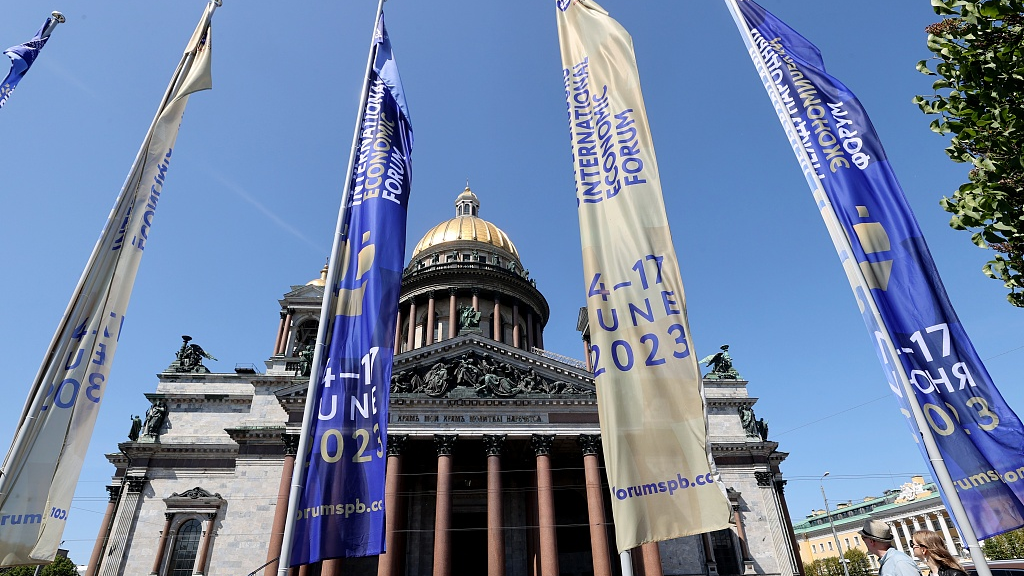
Flags promoting the 2023 St. Petersburg International Economic Forum are pictured outside St Isaac's Cathedral, St. Petersburg, Russia, June 12, 2023. /CFP
Flags promoting the 2023 St. Petersburg International Economic Forum are pictured outside St Isaac's Cathedral, St. Petersburg, Russia, June 12, 2023. /CFP
Editor's note: Andrew Korybko, a special commentator on current affairs for CGTN, is a Moscow-based American political analyst. The article reflects the author's opinions and not necessarily the views of CGTN.
The 26th St. Petersburg International Economic Forum (SPIEF) is taking place from June 14 to 17 and focuses on the theme of "Sovereign Development as the Basis of a Just World: Joining Forces for Future Generations." Russian President Vladimir Putin and his officials have talked about this so much since early 2022.
In the run-up to the last SPIEF one year ago, President Putin told young entrepreneurs that "there is no in-between, no intermediate state: either a country is sovereign, or it is a colony, no matter what the colonies are called." This insight enables one to re-evaluate international relations in a new light. The West's power politics, sanctions threats, and unilateralism can now more clearly be seen for what they've always been instead of what that side has falsely claimed for years.
Far from being done out of "self-defense" in order to uphold the "rules-based order" that China, Russia, and other non-Western countries are falsely accused of violating, they're actually intended to coerce targeted states into surrendering their sovereignty and becoming Western vassals. This small collection of countries can't accept that the global systemic transition to multipolarity is dismantling their erstwhile monopoly on international relations and leading to a more equal world order in its wake.
Their leaders continue clinging to the discredited notion that their societies are "exceptional" and therefore supposedly "superior" to all others', while their elite fear losing their lives of luxury that are the direct result of them exploiting non-Western countries. These respective ideological and economic motivations combined to influence Western policymakers to delusionally try to alter the course of history that was set into motion by these irreversible multipolar processes.
This explains the maximum pressure that they've applied against major countries and smaller ones alike to comply with their demands to turn against Russia despite this being against those same countries' national interests. As could have been expected, this policy failed as proven by The New York Times in their article published on February 23 about how "The U.S. Tried to Isolate Russia. It Didn't Work."
Unbeknownst to ideologically deluded Western leaders and their irredeemably selfish elite, the world has been multipolar for a while already; otherwise they would have succeeded in coercing the rest of those countries into surrendering their sovereignty through these thuggish means. Nevertheless, those several dozen countries that dutifully did the U.S.'s bidding ended up harming everyone else by contributing to the food and fuel crises that seriously afflicted many developing countries over this period.

A worker in charge of coal supply looks on from a coal-fired power station in Saint-Avold, eastern France, November 29, 2022. /CFP
A worker in charge of coal supply looks on from a coal-fired power station in Saint-Avold, eastern France, November 29, 2022. /CFP
Whether that outcome was intended or not, it was interpreted by many of the affected countries as an indirect form of punishment for their refusal to comply with the West's demands. Instead of serving as supplementary pressure upon them to reconsider whether it's worth sticking to their principled defense of national interests, this actually inspired those countries to accelerate the global systemic transition to multipolarity in order to deal a deathblow to the fading U.S.-led unipolar system that threatens all.
It's within this global systemic context that the latest SPIEF is taking place. Unlike during last year's event, which was held just a little less than four months after the West began exerting maximum pressure on all non-Western countries, there's no longer any doubt about the outcome of this aforesaid campaign. It failed to achieve its objectives and actually ended up being counterproductive in hindsight by catalyzing the same multipolar processes that it sought to stymie.
Non-Western countries proved their sovereignty by successfully resisting the West's maximum pressure campaign, but it's now incumbent on them to join forces exactly as the SPIEF's theme this year proposes to ensure that the just world which they're striving to build isn't delayed by any forthcoming provocations.
The West won't stop trying to coerce them to surrender their sovereignty, so the first step is for them all to promote economic integration. The Belt and Road Initiative, the BRICS platform, and Russia's Greater Eurasian Partnership are complementary means to this end, which will be discussed among other related opportunities during the dozens of panel discussions that'll take place at the SPIEF this week. Sovereign development is truly the basis of a more equal world order that the global majority is building, which can be completed much quicker by them working together instead of individually.
(If you want to contribute and have specific expertise, please contact us at opinions@cgtn.com. Follow @thouse_opinions on Twitter to discover the latest commentaries in the CGTN Opinion Section.)